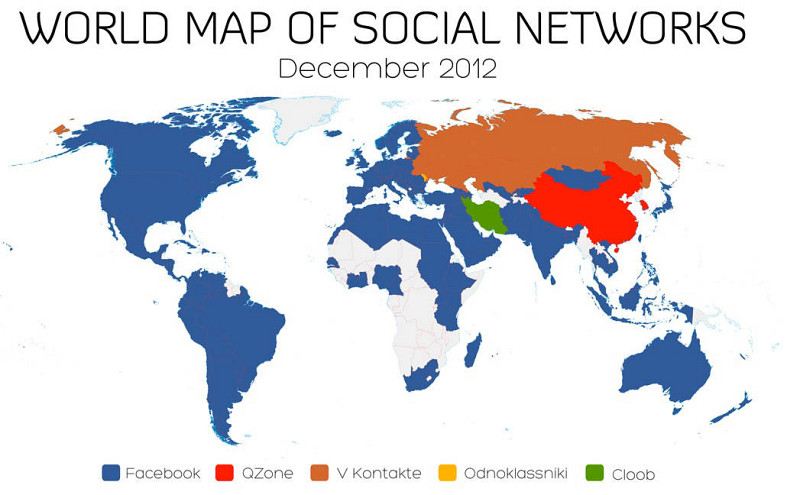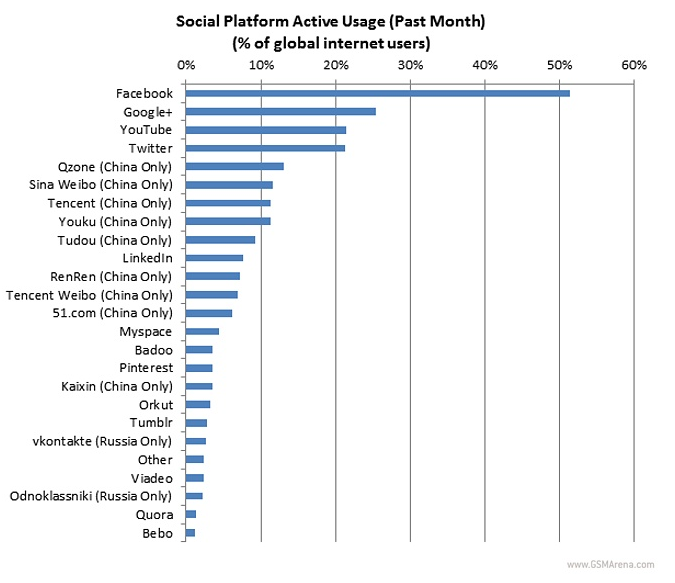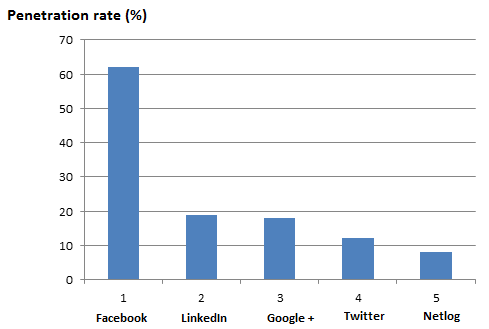To date, Facebook is by far the main social newtork worldwide, with more than a billion monthly active users.
SWOT analysis:
This SWOT analysis consist in a structured strategic planning which aims to evaluate Strengths, Weaknesses, Opportunities and Threats that the environment of the market (in our case, it's online social network) contains. Strengths show company's characteristics which make it better over others. Weaknesses refer to disadvantages over others. Opportunities are the chances to make greater profits using external sources from within the environment. And Threats contain external elements (in the environment) that could cause troubles for the company.
Let's see theses characteristics in the case of Facebook:
|
|
Favorable |
Unfavorable |
|
internal |
Strengths
|
Weaknesses
|
|
external |
Opportunities
|
Threats
|
World position

At the end of the year 2012, only five different social networks are leaders in at least one country while there was seventeen in 2009. In countries such as Brazil (Orkut), Japan (Mixi) or Vietnam (Zing), the principal social network was the national one in 2009. In 2012, Facebook has gained the upper hand on these local networks. The twelve networks that have disappeared from the world map of social networks (between 2009 and 2012) were replaced by Facebook.
Nowadays, Facebook is the leader in 127 countries out of 137.
In Russia, V Kontakte is the leader with over 190 million active users per month. V Kontakte is the national Russian social network. Although it is the leader in Russia, this network is not used in the rest of the world, or practically not. Only, Byelorussia, Kazakhstan and Ukraine have also V Kontakte users.
In China, the most popular social network is QZone (556 million). It is important to remember that China filters the access to foreign social networks.
In Iran, the leader is Cloob. In this country, the implantation of Facebook is difficult because of censorship.

According to Global Web Index report, Facebook, Google+ and Twitter are the most used social platforms. This analysis was realized in January 2013. Another interesting bit from the report shows that Google+ has surpassed Twitter in terms of share and has also had the strongest growth across the 31 globally monitored markets at 40% (in comparison Facebook only grew by 33%).
Predictably, Facebook is leading comfortably with 51% of the global users using the network. Google+ was accessed by 25% of the surveyed users. Twitter along with YouTube share the third spot with 21% share each.
Interestingly, the five social networks that ranked from fifth to ninth are only available in China (Qzone, Sina Weibo, Tencent, Youku and Tudou). However, the study shows that local social networks such as these are rapidly losing market share and some have lost as much as half their members this past year. The business-oriented Linkedin completes the top 10.
A study realized by IAB (interactive Advertising Bureau) and InSites Consulting reveals that 69% of the Belgian population is a social networks user. A Belgian user has an account on three social networks in average but is really active on only 1.4.
Nowadays, social network sites are whole part of our life. In Belgium, at a penetration rate viewpoint, Facebook is the leader (62%) amongst the different social networks. The same trend is observed in Europe (65%). The professional social network LinkedIn is second with a penetration rate of 19%. Google+ is the third (18%).
| Social Network | Market share (Belgium) | Market share (Europe) |
| 62% | 65% | |
| 19% | 14% | |
| Google+ | 18% | 21% |
| 12% | 19% | |
| Netlog | 8% | 7% |
